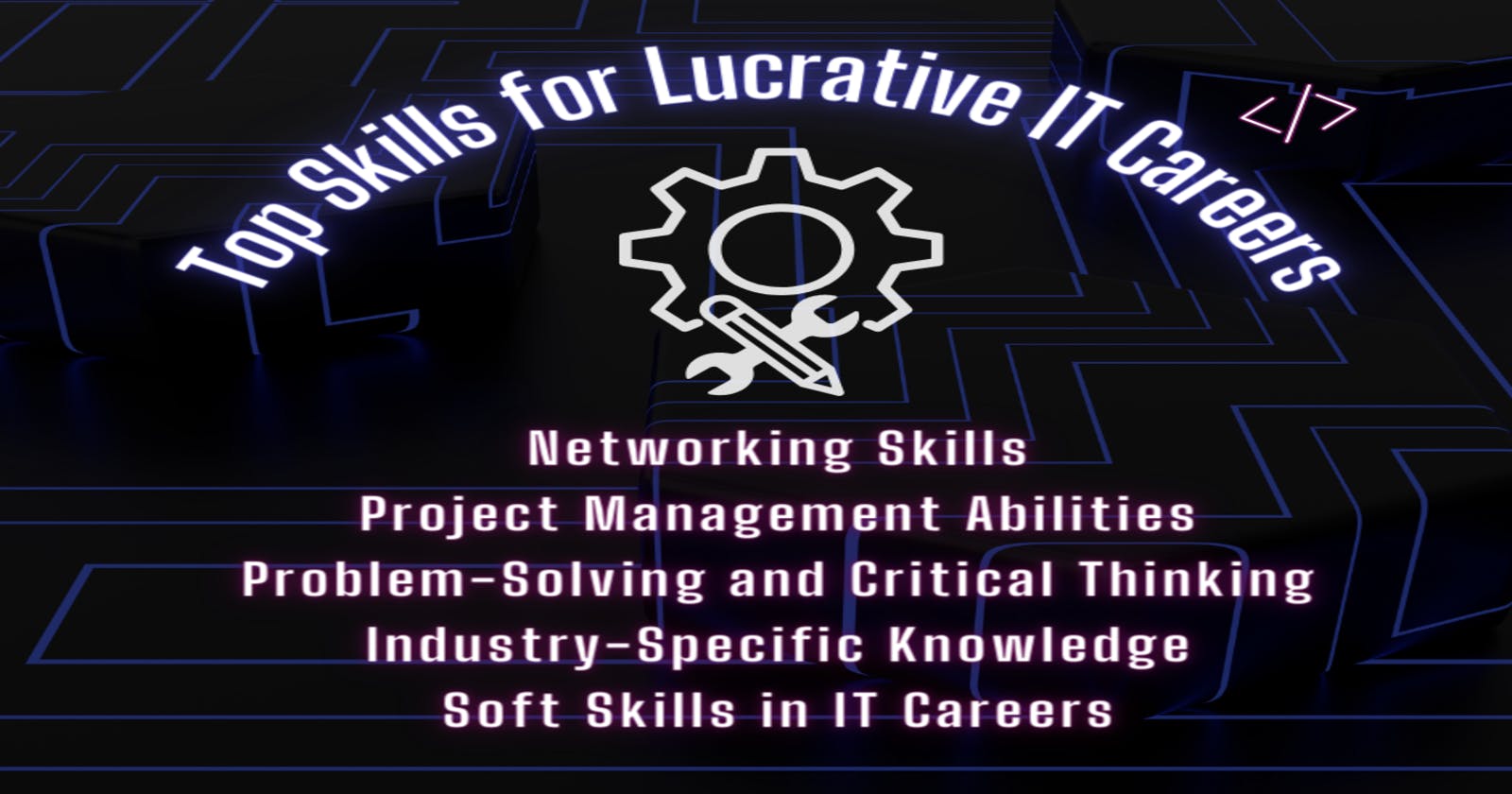In the dynamic landscape of today's job market, the demand for skilled IT professionals is ever-growing. The constant evolution of technology requires individuals in the IT sector to stay ahead of the curve. This article explores the top skills that can pave the way for lucrative IT careers, emphasizing the need for continuous learning and adaptability.
Key Skills for IT Careers
Programming Languages Mastery
Mastering programming languages such as Java, Python, and C++ lays the foundation for a successful IT career. These languages are not only versatile but also form the backbone of software development. Coding skills are crucial in creating innovative solutions and navigating the complexities of IT projects.
Cybersecurity Proficiency
With the increasing threats in the digital landscape, cybersecurity skills have become paramount. IT professionals need to be adept at securing networks, systems, and data. The ability to thwart cyber threats is a valuable skill in safeguarding organizations from potential breaches.
Cloud Computing Expertise
The rise of cloud-based solutions has revolutionized the IT industry. Professionals with expertise in cloud computing can harness its benefits, such as scalability and cost-effectiveness. Cloud skills open doors to opportunities in managing, deploying, and optimizing cloud infrastructure.
Data Analysis and Machine Learning
Big data has become a driving force in decision-making processes. IT professionals skilled in data analysis and machine learning can extract valuable insights from vast datasets. Emerging roles in machine learning, such as data scientists and AI engineers, are in high demand.
Networking Skills
A strong foundation in networking is essential for maintaining IT infrastructure. Networking skills, coupled with relevant certifications, enhance an individual's ability to design, implement, and troubleshoot networks. These skills are fundamental for organizations relying on robust IT systems.
Project Management Abilities
Leading IT projects requires more than technical expertise; it demands project management skills. Certifications like Project Management Professional (PMP) are highly regarded in the IT industry. Professionals with project management abilities can ensure the successful execution of IT initiatives.
Problem-Solving and Critical Thinking
In the ever-evolving world of IT, encountering complex issues is inevitable. IT professionals must possess strong problem-solving and critical thinking skills to navigate challenges efficiently. The ability to analyze situations and devise effective solutions is a hallmark of a successful IT career.
DevOps Practices
DevOps practices bridge the gap between development and operations, fostering collaboration and efficiency. IT professionals embracing DevOps principles streamline workflows, automate processes, and contribute to a more agile and responsive IT environment.
IT Service Management (ITSM)
Efficient delivery of IT services is critical for organizational success. IT Service Management (ITSM) practices, including ITIL certifications, ensure that IT services align with business goals. Professionals with ITSM expertise contribute to seamless service delivery and customer satisfaction.
Communication and Collaboration
Effective communication is pivotal in the success of IT projects. IT professionals need to communicate complex technical concepts clearly and collaborate seamlessly with team members. The use of collaborative tools enhances communication and ensures smooth project execution.
Continuous Learning Mindset
In the fast-paced world of IT, a continuous learning mindset is non-negotiable. Staying updated with the latest technologies and industry trends is crucial for career advancement. IT professionals should embrace learning opportunities and seek to acquire new skills consistently.
Industry-Specific Knowledge
Tailoring IT skills to specific industry demands is a strategic approach. Different sectors may require specialized IT expertise. Professionals who understand industry-specific challenges and solutions position themselves as valuable assets in their respective fields.
Soft Skills in IT Careers
Beyond technical proficiency, soft skills play a vital role in IT careers. Interpersonal skills, teamwork, and client relations contribute to a positive work environment. IT professionals with strong soft skills enhance collaboration and contribute to the overall success of their teams.
Future Trends in IT
In the ever-changing world of Information Technology, finding Highest Paying IT Jobs is like uncovering a hidden treasure. Anticipating future trends in the IT industry is essential for career planning. Professionals who stay informed about emerging technologies, such as artificial intelligence, blockchain, and quantum computing, position themselves at the forefront of the next wave of IT innovation.
Top 5 Lucrative IT Careers
Artificial Intelligence (AI) and Machine Learning (ML) Engineer:
With the increasing integration of AI and ML in various industries, professionals in this field are in high demand. They develop algorithms, models, and systems that enable machines to perform tasks that traditionally required human intelligence.
Cybersecurity Analyst:
With the growing number of cyber threats and attacks, cybersecurity professionals play a crucial role in protecting sensitive information. They design and implement security measures to safeguard computer systems and networks.
Cloud Architect:
As more businesses transition to cloud computing, the demand for cloud architects has risen. These professionals design and build scalable and secure cloud infrastructure for organizations, ensuring efficient data storage and accessibility.
DevOps Engineer:
DevOps (Development and Operations) professionals bridge the gap between software development and IT operations. They focus on automating processes, improving collaboration, and ensuring the efficient and continuous delivery of software.
Data Scientist:
Data scientists analyze and interpret complex data sets to help companies make informed decisions. They use statistical techniques, machine learning, and programming skills to extract valuable insights from data.
Conclusion
In the ever-evolving field of IT, acquiring and honing the right skills is key to a lucrative career. From mastering programming languages to embracing emerging technologies, IT professionals must continuously evolve. By staying adaptable, proactive, and committed to learning, individuals can navigate the complexities of the IT landscape and ensure long-term success.
